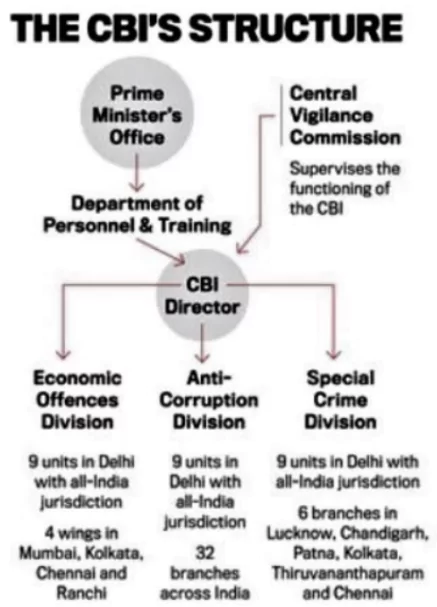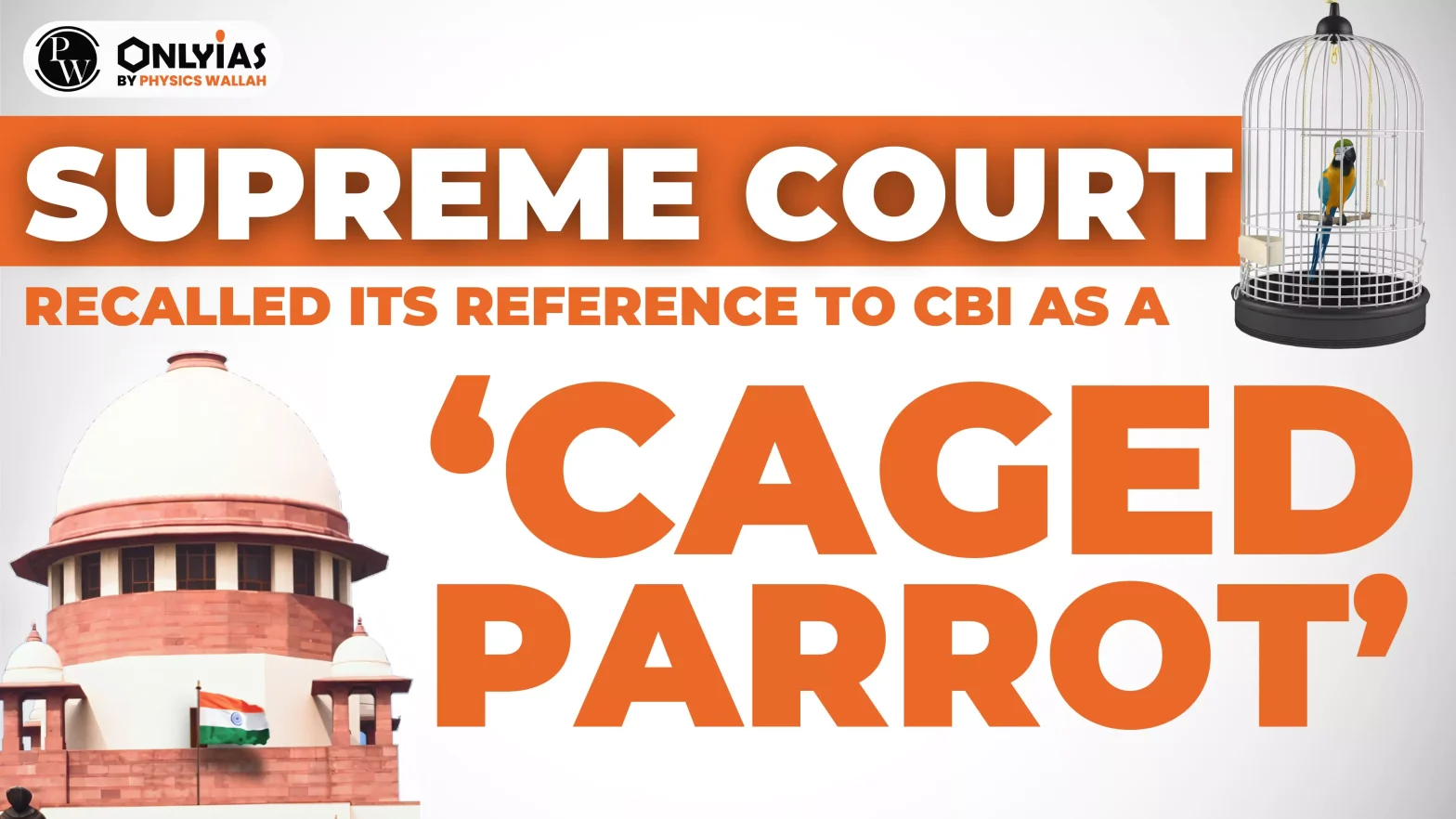For the second time in about a decade, India’s highest court has used the expression “caged parrot” in reference to the country’s premier crime investigation agency.
More About the News
- Bail Granted to Delhi CM: Justice Ujjal Bhuyan made the comment while granting bail to Arvind Kejriwal in the CBI case regarding the alleged Delhi liquor policy scam.
- Fair Investigations: The SC emphasized that the CBI, as India’s premier investigative agency, must ensure its investigations are not only fair but also perceived as fair by the public.
- They linked CBI to Caesar’s wife, stating that an investigative agency must remain “above board” and beyond suspicion.
- Perception of Bias: The Supreme Court stressed the importance of eliminating any perception of bias or unfairness, especially in high-profile cases.
- Reference to CBI’s Autonomy: Justice Bhuyan referred to a 2013 remark by Justice R M Lodha, where the CBI was described as a “caged parrot,” criticizing its lack of independence.
- Context of the Remark: Justice Lodha made this comment during the hearing of the “Coalgate” case, involving alleged irregularities in coal block license allocations.
Enroll now for UPSC Online Course
About the Coalgate Scam
The Coal Block Allocation Scam, also known as Coalgate, involved alleged irregularities in the allocation of coal blocks by the UPA government from 2004 to 2009, without following a process of competitive bidding.
- CAG Report (2012): The Comptroller and Auditor General (CAG) of India highlighted these irregularities in its report, initially estimating a presumptive loss to the exchequer of ₹10.7 lakh crore, which was later revised to ₹1.86 lakh crore.
- Supreme Court’s Observation: The SC criticized the CBI after it was revealed that the agency’s draft status report on the Coalgate case was shared with the Law Minister and political executives. Changes were allegedly made to the report before its submission.
- “Caged Parrot” Remark: Justice R M Lodha, in 2013, referred to the CBI as a “caged parrot” during the hearings, criticizing the agency for functioning under the influence of the political executive, instead of acting independently.
- The metaphor was used to indicate that the CBI was speaking in its master’s voice, undermining its autonomy.
- Impact on CBI’s Image: The CBI’s credibility was questioned due to this controversy, further highlighting concerns about political interference in investigations.
About Central Bureau of Investigation

- Origin of CBI: The Central Bureau of Investigation (CBI) originated from the Delhi Special Police Establishment (DSPE).
- The DSPE was established in 1941 by the Government of India.
- Initial Purpose: Its initial aim was to investigate cases of bribery and corruption related to transactions in the War and Supply Department during World War II.
- Headquarters: The DSPE had its headquarters in Lahore during its early years.
- Post-War Need: After World War II, there was a continued need for a centralized agency to investigate corruption and bribery involving central government employees.
- Transformation to CBI: The Delhi Special Police Establishment was renamed the Central Bureau of Investigation (CBI) in 1963.
- This change was formalized through a Home Ministry resolution.
- Not Statutory Body: The CBI is neither a statutory body nor a constitutional body. It derives its power to investigate from the Delhi Special Police Establishment Act, 1946.
Types of Cases Handled by CBI
- Corruption Investigations: The CBI is responsible for investigating cases under the Prevention of Corruption Act involving public officials and employees of Central Government, PSUs, and Government-controlled bodies.
- Economic Offenses: It handles major financial scams and serious economic frauds, including cases related to counterfeit currency, bank frauds, cybercrimes, and violations in foreign exchange and smuggling of narcotics and contraband items.
- Serious and Organized Crimes: The agency investigates serious crimes under the Indian Penal Code (IPC), often on the requests of State Governments, or via orders from the Supreme Court and High Courts, including terrorism, bomb blasts, and organized crime.
- Suo Moto Cases: The CBI can initiate investigations independently, but only within Union Territories.
- State Government Consent: The Central Government can authorize the CBI to investigate crimes within a State only with the State Government’s consent.
- Judicial Orders: The Supreme Court and High Courts can order the CBI to investigate any crime across the country, without needing State consent.
Check Out UPSC CSE Books From PW Store
Recent Cases of CBI acting as a Caged Parrot
- 2G Spectrum Allocation Case: The CBI was accused of delaying the investigation into the alleged scam involving the allocation of 2G spectrum licenses during the UPA regime. The case implicated several political leaders, and there were allegations of political interference in the investigation process.
- Vyapam Scam (Madhya Pradesh): The investigation into the Vyapam recruitment scam was initially seen as botched, with multiple mysterious deaths of witnesses and accused persons. The Supreme Court handed over the investigation to the CBI, but the agency’s probe was questioned for slow progress and perceived lack of independence.
- INX Media Case Issue: The arrest and investigation of former Finance Minister P. Chidambaram in the INX Media case were seen by some as politically motivated. Opposition parties claimed the CBI was being used to target political rivals of the ruling party.
- Saradha Chit Fund Scam: The investigation into the Saradha Chit Fund Scam involved high-profile political leaders, and the CBI was accused of deliberately delaying action against politicians. There were accusations of the agency being pressured by political interests.
- CBI Director Conflict: A public feud between two top CBI officers—Director Alok Verma and Special Director Rakesh Asthana—led to accusations of political interference and internal corruption within the agency.
Reasons behind CBI acting as Caged Parrot
- Administrative Control: The CBI operates under the Department of Personnel and Training (DoPT), which falls under the Prime Minister’s Office (PMO). This direct administrative link makes it susceptible to political interference in its functioning, particularly in high-profile cases involving government officials.
- Appointment of Key Officials: The appointment of the CBI Director involves a selection committee led by the Prime Minister, the Leader of Opposition (LS) and the Chief Justice of India (CJI). However, the government’s influence remains dominant.
- There are concerns that post-retirement benefits for senior officials further compromise their independence, making them prone to government’s influence.
- Prior Approval for Probes: The CBI needs prior approval from the Central Government before investigating senior officials (Joint Secretary level and above). This requirement, especially in corruption cases, restricts its ability to probe freely and can serve as a significant hurdle in cases involving high-ranking officials.
- State Consent: The CBI requires state government consent to investigate crimes within that state. Several states, such as West Bengal and Punjab, have revoked general consent, accusing the CBI of being politically misused by the central government. This limits the agency’s jurisdiction and affects its efficiency.
- Non-Statutory Status: The CBI lacks a statutory backing, as it derives its powers from the Delhi Special Police Establishment Act (1946). This makes the agency more dependent on executive decisions and susceptible to political influence, unlike agencies with clearer legislative frameworks.
- Public Perception and Credibility: Several high-profile cases, such as the Bofors and Hawala scandals, have further dented the CBI’s credibility, with delays and accusations of manipulation to serve political interests. This has led to the perception that the CBI functions more as a political tool than an independent investigative agency.
- Acute shortage of personnel: A major cause of the shortfall is the government’s sheer mismanagement of CBI’s workforce, through a system of inefficient, and inexplicably biased, recruitment policies – used to bring in favored officers, possibly to the detriment of the organization.
Supreme Court Judgments on CBI Autonomy and Functioning
- Vineet Narain vs. Union of India (1997): The judgment established various safeguards for CBI autonomy such as appointment of CBI Director by a high-powered committee and the fixed tenure of two years for the CBI director
- Subramanian Swamy vs. Director, CBI (2014):
- It struck down Section 6A of the Delhi Special Police Establishment Act, which required prior government approval to investigate senior officials.
- The judgment ruled that this provision violated Article 14 (Equality before Law) of the Constitution, enhancing CBI’s independence.
- Common Cause vs. Union of India (2018):
- The judgment upheld the validity of Section 4A of the DSPE Act, which requires a selection committee (PM, Leader of Opposition, CJI) for the appointment/removal of the CBI Director.
- It directed transfers or changes in duties of the CBI Director must have the committee’s consent.
Enroll now for UPSC Online Classes
Recommendations for ensuring independence of CBI
- Separation of Administrative Control: For the CBI to remain independent, it must be freed from the government’s control over appointments and transfers. As long as the government retains this power, the CBI’s ability to conduct free and fair investigations will be compromised.
- Statutory Status: There is an urgent need to provide CBI, a statutory status through legislations in order to provide it independence akin to Comptroller & Auditor General and the Election Commission.
- Structural Reform and Dedicated Cadre Development: The CBI should be split into two units: an Anti-Corruption Body and a National Crime Bureau, ensuring specialization in both fields.
- Furthermore, the agency should focus on building its own dedicated cadre of officers, reducing dependence on external services and improving professionalism.
- Recommendations of 24th report of the Parliamentary Standing Committee on CBI: The following recommendations could strengthen CBI and ensure its independence.
- Strengthen manpower within the CBI to improve operational capacity.
- Enhance infrastructure and invest in better facilities.
- Increase financial resources and administrative autonomy while ensuring accountability.
- Grant more investigative powers across matters listed in the Union, State, and Concurrent Lists of the Constitution’s 7th Schedule.
- Propose a new law under the Central Bureau of Intelligence and Investigation Act to replace the outdated DSPE Act.
- Other Recommendations: Earlier recommendations, such as the L P Singh Committee (1978) and the Second Administrative Reforms Commission (2007), similarly emphasized the need for a comprehensive central legislation to empower the CBI with a self-sufficient statutory framework.
![]() 14 Sep 2024
14 Sep 2024


